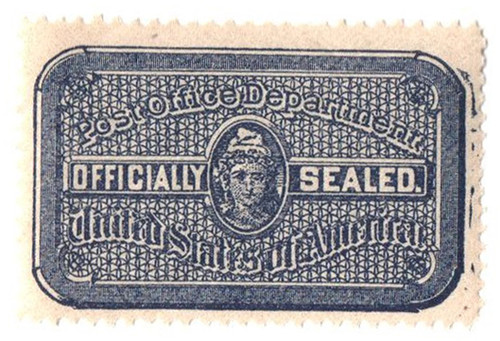

# OXF1e - 1872 Post Office Seal - printed on both sides, back, green
Post Office Seals- A Neat Piece of Postal History, Missing From Many Collections
Official seals, also known as post office seals, are used by post offices around the world. These adhesive seals have played important roles through the years. The seals have no franking power, that is, they do not pay for the delivery of mail.
U.S. official seals began with one specific role: to seal large "registered packages" containing registered letters that were being transported, thereby preventing tampering with this very secure class of mail.
The 1877 seals were created to be used by dead letter offices when undeliverable mail was opened in an attempt to obtain needed delivery information. The seal was used to close the mailed item and to provide an explanation of why it had been opened.
Small design changes continued to occur as the use of the seals expanded into each post office. Official seals were commonly used to reseal damaged envelopes, to prevent the contents from being lost prior to delivery.
Sealed envelopes would often bear a handstamp or written notation indicating that the item was received damaged or was damaged in processing. This is one of the more common uses of the seals over the years.
Official seals underwent a substantial design change in 1972, following the Postal Reorganization Act and the launch of the United States Postal Service. The stylized eagle insignia of the renamed agency appeared in the place of the Liberty vignette, or central design.
Post Office Seals- A Neat Piece of Postal History, Missing From Many Collections
Official seals, also known as post office seals, are used by post offices around the world. These adhesive seals have played important roles through the years. The seals have no franking power, that is, they do not pay for the delivery of mail.
U.S. official seals began with one specific role: to seal large "registered packages" containing registered letters that were being transported, thereby preventing tampering with this very secure class of mail.
The 1877 seals were created to be used by dead letter offices when undeliverable mail was opened in an attempt to obtain needed delivery information. The seal was used to close the mailed item and to provide an explanation of why it had been opened.
Small design changes continued to occur as the use of the seals expanded into each post office. Official seals were commonly used to reseal damaged envelopes, to prevent the contents from being lost prior to delivery.
Sealed envelopes would often bear a handstamp or written notation indicating that the item was received damaged or was damaged in processing. This is one of the more common uses of the seals over the years.
Official seals underwent a substantial design change in 1972, following the Postal Reorganization Act and the launch of the United States Postal Service. The stylized eagle insignia of the renamed agency appeared in the place of the Liberty vignette, or central design.








